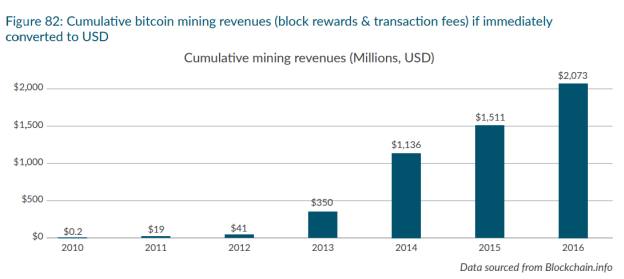So for tech-savvy people, rather than trading Bitcoin and relying on being able to time price movements accurately, they can instead 'mine' for bitcoin by creating these bit-strings, these hashes, into blocks they can then add to the global blockchain ledger. As a reward, they get their Bitcoins.
The 116-page Global Cryptocurrency Benchmarking Study by Dr Garrick Hileman and Michel Rauchs of the Cambridge Centre for Alternative Finance at Judge Business School is a long read, but very helpful in delineating how mining works, how people can put cryptocurrency into virtual 'wallets' and the various risk management and challenges.
Competition and cost
One big development is that mining has gone from the purview of a few PC users to a global operation, with self-miners competing against globalised cloud mining services and even remote hosting services, whereby people can take part in the process of mining cryptocurrency without having to run the equipment themselves.
These servers are huge and because the operations have become so professionalised, the money to be made by mining is probably more than the money to be made by people trading bitcoins.
According to the Cambridge study, bitcoin miners alone have earned more than $2bn (£1.4bn) to date (see chart).
Some analysts have commented there has to be an ultimate end to the creation of blocks on the global ledger. What happens when space runs out?
Will there be new blockchain ledgers created? Will there be a finite number of bit strings that can be mined and hashed together to create these blocks?
Moreover, transaction fees as a percentage of total Bitcoin mining revenues have risen significantly, at more than 6 per cent as of the first quarter 2017, up from less than 1 per cent in 2014. Perhaps as a result, transaction fees are starting to rise, just as the price of cryptocurrencies is falling.
Could this also start to put the brakes on heavy mining activity?
As Coutts' Ms Chovin explains: "Transaction fees are quite high compared to other forms of payment.
"With the demand for Bitcoin taking off, the cost of making transactions has risen to as high as $40 (£28) per transaction. This is a little high if you are trying to buy a sandwich for lunch.
"By comparison, debit card transactions typically cost around 30 basis points of the transaction, a £4 sandwich might come with a transaction cost of around a penny."
Supply and demand
The Cambridge study said both small and large miners were also concerned about fierce competition among miners of the same cryptocurrency, and insufficient availability of capital to continually replace or upgrade current mining infrastructure, which could also put limitations on how much can be mined.







